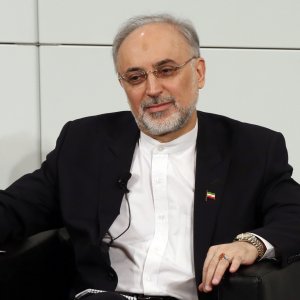
AEOI Chief Underscores Nuclear Progress

The landmark accord between Iran and P5+1 (the five permanent members of the UN Security Council plus Germany) has been in effect since January 2016 to scale down Tehran's nuclear work in return for relief from international sanctions.
The interim curbs on the nuclear program included a pledge to keep the uranium stockpile under 300 kg of up to 3.67% enriched uranium hexafluoride, also known as UF6, the form in which uranium can be enriched in centrifuges.
The Atomic Energy Organization of Iran released a statement in late January, announcing that it had begun injecting UF6 into advanced IR-8 centrifuges.
AEOI Director Ali Akbar Salehi has said the process has advanced more smoothly than expected.
"The UF6 injection test will take two years to complete and then we'll proceed to produce cascades for this centrifuge [IR8]," Salehi said in a Saturday talk with the state broadcaster on the occasion of National Nuclear Technology Day.
The injection marked a milestone in Iran's nuclear research and development. It is consistent with the nuclear deal that allows research activities on the eighth and most advanced generation of Iran's centrifuges, developed by Iranian experts and engineers.
Salehi said Iran is currently mass-producing the previous generations of the centrifuge machines.
"We are doing well on IR2, IR4 and IR6 centrifuges and have initiated mass production," he added.
The curbs imposed on Tehran's nuclear program also included a two-thirds cut in the number of centrifuges installed at Fordo and Natanz enrichment facilities.
Salehi said his organization is conducting exploration across the country for natural uranium reserves to meet the domestic need for the rare material.
"Exploration and extraction are regarded as the most strategic part of the country's nuclear industry and the efforts to produce natural uranium domestically. If we do not do so, in the future we would face pressure from other countries for procuring natural uranium," he said.
The AEOI chief said Iran has imported 360 tons of yellowcake since the nuclear pact took effect, lamenting that those stocks would have increased more than threefold had Britain agreed to approve Iran's purchase deal with Kazakhstan.
Iran is authorized by the nuclear agreement to purchase natural uranium or yellowcake. However, to do so it is required to seek the approval of the Joint Commission, a body of representatives from all the seven parties to nuclear pact tasked with overseeing its implementation.
Iran submitted a request to the panel a few months ago to buy 900 tons of Kazakh yellowcake.
While other powers gave their approval, Britain had second thoughts and changed its mind at the last minute, denying Iran the unanimous endorsement to allow the yellowcake deal to go through.
Salehi acknowledged the authority of each panel member to either approve or reject such requests, but said, "They [Britain's representatives] claimed this amount of yellowcake is beyond Iran's needs while it is us to assess the amount required."
"The Foreign Ministry is seriously following up the issue," he said.


Trump weighs using $2 billion in CHIPS Act funding for critical minerals

Codelco cuts 2025 copper forecast after El Teniente mine collapse

Electra converts debt, launches $30M raise to jumpstart stalled cobalt refinery

Barrick’s Reko Diq in line for $410M ADB backing

Abcourt readies Sleeping Giant mill to pour first gold since 2014

Nevada army depot to serve as base for first US strategic minerals stockpile

SQM boosts lithium supply plans as prices flick higher

Viridis unveils 200Mt initial reserve for Brazil rare earth project

Tailings could meet much of US critical mineral demand – study

Kyrgyzstan kicks off underground gold mining at Kumtor

Kyrgyzstan kicks off underground gold mining at Kumtor

KoBold Metals granted lithium exploration rights in Congo

Freeport Indonesia to wrap up Gresik plant repairs by early September

Energy Fuels soars on Vulcan Elements partnership

Northern Dynasty sticks to proposal in battle to lift Pebble mine veto

Giustra-backed mining firm teams up with informal miners in Colombia

Critical Metals signs agreement to supply rare earth to US government-funded facility

China extends rare earth controls to imported material

Galan Lithium proceeds with $13M financing for Argentina project

Kyrgyzstan kicks off underground gold mining at Kumtor

Freeport Indonesia to wrap up Gresik plant repairs by early September

Energy Fuels soars on Vulcan Elements partnership

Northern Dynasty sticks to proposal in battle to lift Pebble mine veto

Giustra-backed mining firm teams up with informal miners in Colombia

Critical Metals signs agreement to supply rare earth to US government-funded facility

China extends rare earth controls to imported material

Galan Lithium proceeds with $13M financing for Argentina project

Silver price touches $39 as market weighs rate cut outlook

















